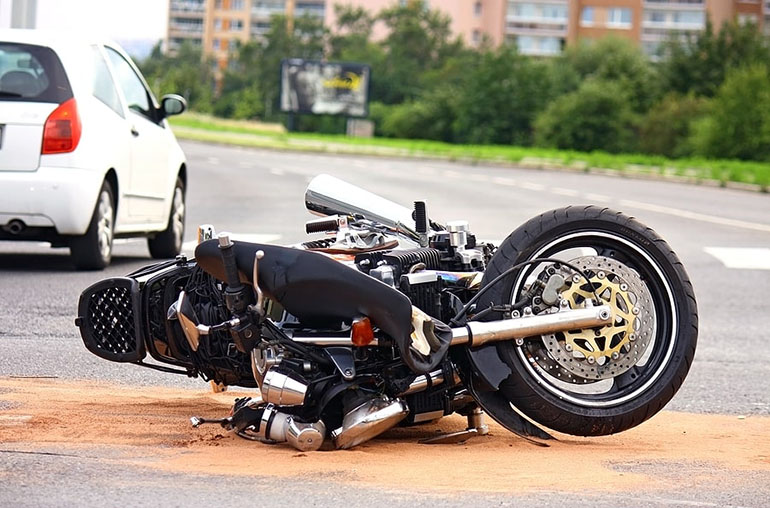
Motorcycle accidents are common in the busy lifestyle of Long Island, with its wide roadways and heavy traffic. Even though the area around the Montauk Lighthouse and the Hamptons is steeped in history, driving in this area can be challenging due to the high traffic volume. More than 2,000 people are injured yearly in New York State motorcycle accidents, with moderate to severe injuries being the most common outcomes.
After a car accident, your mind and body are in turmoil and confusion, and you may find yourself saying words like “I’m sorry,” even if it wasn’t your fault. Does saying you’re sorry for a motorcycle accident hurt your case? This blog post dives into the impacts of expressing regret post-accident. However, if you were injured in an accident and require a case review, contact a Garden City motorcycle accident lawyer who can guide you appropriately through the legal process.
While the specifics of each personal injury case will always be different, lawyers know that there are some universal truths to be applied, such as choosing your words carefully after an accident to avoid prejudice in the outcome of any potential litigation. It may come as a surprise, but even simple actions like showing sympathy or accepting blame can impact the outcome of court proceedings or insurance payouts.
In most jurisdictions, the penalties for admitting fault after an accident are harsh, especially when considering causes of motorcycle accidents. If you accept responsibility for an accident, you may waive your right to sue for compensation from anyone else who had a hand in causing it. This means that the other driver can use your admission of fault against you in court, even though they were the primary cause of the accident and your injuries.
In addition, other motorists and witnesses may assume you caused the collision if you apologize at the scene. Hence, you risk limiting your future legal possibilities if you incriminate yourself inadvertently.
The principle of comparative fault further underscores the importance of admitting fault cautiously. Your compensation may be reduced based on how much fault you bear for the accident. This is primarily applicable in jurisdictions that use the comparative fault rule. Therefore, it becomes crucial to carefully navigate apologies and comprehend the complexities of assuming fault to protect your legal rights.
There is danger in apologizing for anything on the scene. However, expressing sympathy after a motorcycle accident does not always constitute an acknowledgment of fault. Note that this consideration differs from place to place, depending on civility laws and customs.
Here’s an example: A truck driver who ignored posted speed limits caused a collision that left a rider with minor injuries. As the rescue workers carried the victim away from the scene, the rider turned to the other party and murmured, “I’m so sorry.” In this case, the rider was sorry for the other person’s trauma, not because he broke the law or was responsible for the accident.
Furthermore, legal precedent suggests that expressions of regret following an accident need not always be interpreted as admissions of responsibility. When rendering a decision, the court will typically consider the apology’s context, any other relevant evidence, and any suggestions made by experts.
Limiting specific language may help motorcyclists avoid unintentionally admitting fault. Refrain from saying “sorry.” Instead, use words like “excuse me” or simply refrain from offering apologies altogether unless you are responsible. Avoid discussing blame or causation outside your lawyer’s presence.
If you have limited English proficiency, only use general, short, plain phrases while avoiding idioms.
It cannot be emphasized enough that distracted driving is not an acceptable justification for negligent vehicular behavior. Drivers who cause motorcycle accidents that lead to severe injuries, such as spinal cord damage that can end in paralysis, should be held responsible.
After being involved in a motorcycle accident, there are several steps motorcyclists can take to protect themselves legally:
If you’ve been in a motorcycle accident resulting from another person’s carelessness, you shouldn’t immediately apologize. Riders need not apologize for an accident they caused but should recognize its occurrence.
Apologies are an act of goodwill and compassion when accidents occur; nevertheless, they need not have legal ramifications as long as they do not infer or suggest direct admissions of liability. Most importantly, people in motorcycle accidents should get medical help and consult lawyers specializing in personal injury lawsuits.

Automotive Addicts Contributors are a collective of guest writers, industry professionals, and passionate enthusiasts who bring fresh perspectives to the Automotive Addicts platform. Focused on delivering timely news, in-depth reviews, and unique insights, these contributors help keep the site dynamic and engaging. Many use the platform to expand their reach and build credibility within the automotive media world, adding depth and variety to the content that drives the Automotive Addicts community.